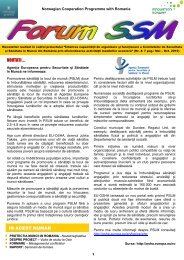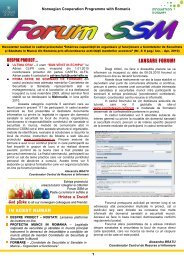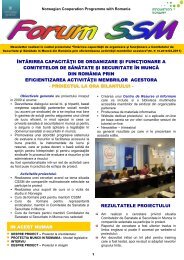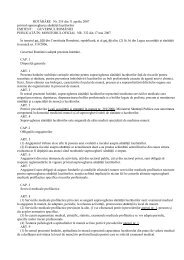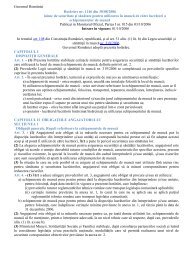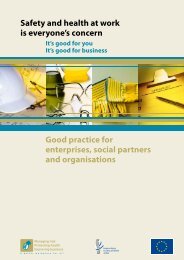Preventing work-related musculoskeletal disorders - European ...
Preventing work-related musculoskeletal disorders - European ...
Preventing work-related musculoskeletal disorders - European ...
You also want an ePaper? Increase the reach of your titles
YUMPU automatically turns print PDFs into web optimized ePapers that Google loves.
<strong>Preventing</strong> <strong>work</strong>-<strong>related</strong> <strong>musculoskeletal</strong> <strong>disorders</strong><br />
especially areas for maintaining knives, hygiene, storage,<br />
transport and <strong>work</strong>ing conditions. In light of the survey, a<br />
plan is drawn up.<br />
The implementation of the plan includes the provision of a<br />
training course on how to sharpen instruments. Specially<br />
selected <strong>work</strong>ers in the company undergo a three-day<br />
training course, who, in turn, train their colleagues. The<br />
training includes the <strong>work</strong>er being shown photographs<br />
taken with an electronic microscope of different injuries<br />
that can occur - usually invisible to the eye - by using a<br />
knife. It reveals the detrimental effects a badly maintained<br />
knife can have on the body.<br />
The initiative also opens up different areas relating to <strong>work</strong><br />
organisation, management, production, product quality<br />
and <strong>work</strong>ing conditions. The plan enables discussions to<br />
take place within the frame<strong>work</strong> of <strong>work</strong>ing groups,<br />
facilitating companies to develop practical ideas to<br />
eliminate <strong>work</strong>ing conditions that give rise to MSDs.<br />
For further information contact: Daniel Lavallee, Caisse<br />
Centrale de Mutualité Sociale Agricole, email:<br />
lavallee.daniel@ccmsa.msa.fr<br />
RETAIL THERAPY<br />
Musculoskeletal problems can readily arise in the food retailing<br />
industry, whether in warehouses, during transportation of<br />
goods or in shops.<br />
For instance, MSDs can be caused due to the weight and size<br />
of boxes, the type of packaging used or the height of palettes<br />
especially in warehouses and distribution, while in shops poor<br />
ergonomic design of cashiers’ <strong>work</strong>stations can lead to MSDs.<br />
According to Mr Joachim Larisch (BIPS), one of the authors of<br />
a research study* on occupational safety and health in food<br />
retailing funded and scientifically accompanied by, among<br />
others, the German Federal Institute of Occupational Safety<br />
and Health and REWE, organisational and technical changes<br />
can reduce the risk of MSDs.<br />
The REWE-Group, described by Mr Larisch as “one of the<br />
most important retail companies in the world” employs about<br />
230,000 people worldwide, of whom some 180,000 are based<br />
in Germany.There, some 30 central warehouses deliver goods<br />
to some 9,500 shops.<br />
REWE established a <strong>work</strong>place health promotion plan in the<br />
beginning of 1990. In co-operation with the company’s<br />
health insurance company, health circles and <strong>work</strong>placeoriented<br />
interventions were established to reduce MSDs,<br />
says Mr Larisch.<br />
“Employees participating in the health circles developed more<br />
than 470 proposals to improve <strong>work</strong>place safety and <strong>work</strong>ing<br />
conditions. Nearly 50 per cent of these proposals have been<br />
adopted. More than 100 proposals concentrated on the<br />
<strong>work</strong>ing conditions in the warehouses, where manual <strong>work</strong> still<br />
is predominant.”<br />
Health insurance company data show that intervention<br />
programmes have helped to reduce MSD-<strong>related</strong><br />
absenteeism.<br />
“Workplace oriented programmes to improve manual handling<br />
of commodities took place in 1995 until 1999. These initiatives<br />
led to organisational and technical changes in the<br />
warehouses,” he says.<br />
“Additionally, the REWE-Group ordered new technical<br />
equipment in order to facilitate the collection of goods in<br />
warehouses.”<br />
In Germany, more than 20,000 cashiers’ <strong>work</strong>stations in some<br />
6,000 <strong>work</strong>places were equipped with new chairs to reduce<br />
MSDs. Moreover, cashiers’ <strong>work</strong>stations were re-designed to<br />
provide a healthier <strong>work</strong> environment.<br />
Employees’ representatives, Berufsgenossenschaften<br />
(German statutory accident insurance institutions) and state<br />
institutions co-operated in this process. Absenteeism due to<br />
sickness leave has been reduced from 4.9 to 3.7 per cent<br />
between 1994 and 1997 in the REWE-Group, while data<br />
provided by the health insurance company show a decline in<br />
MSDs after <strong>work</strong>place health interventions. It seems<br />
reasonable to assume that health promotion at the <strong>work</strong>place<br />
significantly contributed to a reduction in absenteeism and<br />
<strong>work</strong>ers’ ill-health.<br />
REFERENCES<br />
Larisch, J./Bieber, D./Hien, W.: Qualitaetsmanagement und<br />
integrierter Arbeits- und Gesundheitsschutz im Lebensmittelhandel.<br />
Workshops und Zwischenberichte. (Schriftenreihe der Bundesanstalt<br />
fuer Arbeitsschutz und Arbeitsmedizin - Fa. 47 -). Dortmund/Berlin,<br />
1999 (English Summary)<br />
Bieber, D./Larisch, J./Moldaschl, M.: Ganzheitliche Problemanalyse<br />
und -loesung fuer den betrieblichen Arbeits- und<br />
Gesundheitsschutz in einem Lager des Lebensmittelhandels.<br />
(Schriftenreihe der Bundesanstalt fuer Arbeitsschutz - Fa.33 -). 2.<br />
Aufl., Dortmund, 1996 (English Summary)<br />
SHOPPING FOR<br />
ANSWERS<br />
A <strong>European</strong> Week co-funded project is focusing on cutting<br />
the risks for supermarket <strong>work</strong>ers.<br />
An analysis of <strong>work</strong>-<strong>related</strong> accidents occurring at Eroski<br />
supermarket in Bilbao showed that the main type of<br />
accidents were <strong>musculoskeletal</strong> injuries.<br />
<strong>European</strong> Agency for Safety and Health at Work<br />
29



